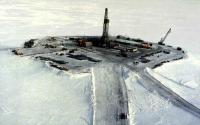Arctic Oil

The exploration of the Arctic for petroleum is more technically challenging than for any other environment. However, with increases in technology, continuing high oil prices and drastic melting of glaciers and ice due to global warming (making it easier to drill and explore), the region is now receiving the interest of the petroleum industry.
Quicktabs: Keywords

This week, scientists made a disturbing discovery in the Arctic Ocean: They saw "vast methane plumes escaping from the seafloor," as the Stockholm University put it in a release disclosing the observations. The plume of methane—a potent greenhouse gas that traps heat more powerfully than carbon dioxide, the chief driver of climate change—was unsettling to the scientists.
[ More ]
Exploiting oil and gas resources in the Arctic and the Gulf of Mexico, while also avoiding disastrous spills, will require international cooperation according to a senior official from the U.S. Department of Energy.
[ More ]
The Arctic may contain 10-15 percent of the world's undiscovered oil reserves, with most of that oil located in the seabed of the Arctic Ocean. And China, thanks to its financial rather than military strength, could take the lion's share.
[ More ]
The recent failute of Shell's oil rig in the Arctic hasn't discouraged the world's top energy companies from actively securing long-term oil and gas resources along other Arctic shores, primarily in offshore Russia. Still, the question remains: Is Arctic oil exploration dead in the United States? Not likely, according to most energy experts.
[ More ]